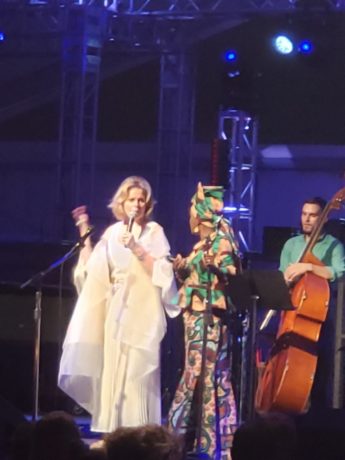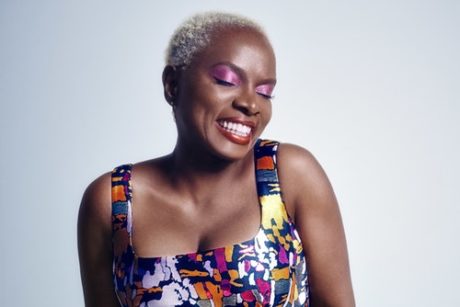Two of the world’s biggest voices blended beautifully Thursday night on the Main Stage at the Kennedy Center’s REACH Opening Festival, demonstrating the power of song to unify and inspire disparate communities, enough even to collectively bust a move.

Culminating a day-long series of REACH festival programming dedicated to the healing power of music, and in particular, the voice, soprano Renée Fleming, pianist Jason Moran, and world music superstar Angélique Kidjo delighted a crowd filled with classical music and Afro-pop lovers alike. The show began with Fleming’s carefully phrased delivery of a selection of classics ranging from American standards such as Wood and Mellin’s “My One and Only Love,” to a more soulful rendering of a soprano vocal canon favorite: Rachmaninoff’s “Vocalise.” Accompanying Fleming was Moran, who demonstrated his gift for seamlessly flowing jazzy riffs into classical structures. Moran impressively anticipated Fleming’s phrasing, which he matched with Keith Jarrett-like chord voicings that made one ache and then feel soothed within just a few bars.
Neither lost a beat when twice, what looked in the night sky to be aircraft from Marine Helicopter Squadron One, flew so low over the outdoor, riverside stage by the Potomac before banking off, it felt like a war zone.
Nor did the duo flinch during a brief downpour as Fleming delivered a dreamy-eyed rendition of Chuck Mangione’s “Land of Make Believe.”
Neither did the rain deter a growing crowd of world music lovers from arriving in time to hear the multiple Grammy Award-winning singer Angélique Kidjo (along with soloist Dominic James on guitar and Mark G. Meadows on piano leading The Movement), perform a run of infectiously danceable originals such as her call and response tune, “Afrika” and covers of Afro-Caribbean inspired classics like Bob Marley’s “Redemption Song.” But the hands-down hit of the evening was Kidjo’s take on Miriam “Mama Africa” Makeba’s “Pata Pata” which had everyone on their feet, gleefully twisting and bopping. (Fleming is also a multi-Grammy Award winner; Moran has been nominated.)
In between their respective solo performances, Fleming and Kidjo together performed the aria “Summertime” from Gershwin’s Porgy and Bess, and Leonard Cohen’s popular hymn, “Hallelujah.”

“I have never sung this song before, ever,” Kidjo said of Cohen’s popular tune. The surprised Fleming thanked her co-star for agreeing to do it. “I am doing it because you asked me to,” Kidjo replied.
It was, in retrospect, a symbolic admission.
Even now that she no longer regularly performs her trademark repertoire, I might easily walk barefoot through fire and ice to hear Fleming sing Strauss were she ever to do so publicly again. Still, I have never been much convinced of her forays into singing popular music, including Broadway show tunes. To my ear, decades of technique developed in service to transporting her enormous voice from note to note does not lend itself well to the imprecise slip-slide of pop and rock singing.
But something intriguing happened during her duet with Kidjo.
When they sang the Gershwin together, Fleming began by singing operatically. But when she tried to match Kidjo’s earthier, less technical take on the lines – which were just as beautiful, but different – Fleming sounded stilted. It was as I always hear the diva’s non-operatic performances: the soprano of our generation who can sing arias inflected with bluesy scoops, but who has difficulty delivering the blues with an operatic instrument.

When the two women sang “Hallelujah,” however, Fleming’s innate grace prevailed. She allowed Kidjo to lead, even admitting to the audience (mid-song!) she wasn’t sure she could sing with the kind of uncomplicated approach of her co-star. But she tried. She didn’t focus on the technical precision of her voice, but on the reality of it and for the first time to my ears, she sounded natural and confident while singing a non-classical piece. It was indeed a “Hallelujah!” moment to hear.
For me, it also was profound to witness Fleming who, as the Kennedy Center’s artistic advisor-at-large is one of our nation’s most respected cultural ambassadors, publicly admitting a weakness and allowing herself to be led by another international stateswoman of song, Kidjo, into a place where together they created something moving and true, something that previously was never quite “right” to my ears when Fleming tried it on her own.
It was symbolic of the work being done as part of Fleming’s Sound Health Initiative, co-led with National Institutes of Health Director Francis Collins, and highlighted during the festival’s day-long focus on the interplay between the brain and music.
In a session just prior to the concert, Charles Limb, MD, an otolaryngologist and surgeon, shared images taken of three different vocal musicians’ brains as they performed inside an MRI machine. The images showed that activity in certain regions of the artists’ brains correlated with specific tasks they were performing. Improvisation seems to rely upon quieting executive function, vocalizing with technique needs more executive function, while creating call and response vocal percussion riffs utilizes brain regions that are essential for listening to someone speak and responding in kind.
Though the results are preliminary, Limb theorized that “Music could be our universal language, because it employs the same areas of the brain responsible for vocabulary. It makes me wonder which came first, language or music.”
Kidjo is not waiting for the science to confirm the origins of song or its power to communicate. When the audience did not sing loud enough for her taste during a call and response, she chided, “This is Washington, DC. If you can’t sing, what is going to happen to the world?”
Running Time: Approximately 90 minutes, with no intermission.
Renée Fleming, Angélique Kidjo, and Jason Moran in Concert ran for one performance only at The REACH Opening Festival, which runs through September 22, 2019, at The John F. Kennedy Center for the Performing Arts, 2700 F Street NW, Washington, DC. The complete schedule is here. Free timed passes are available at the box office, by phone at (202) 467-4600, or online.




